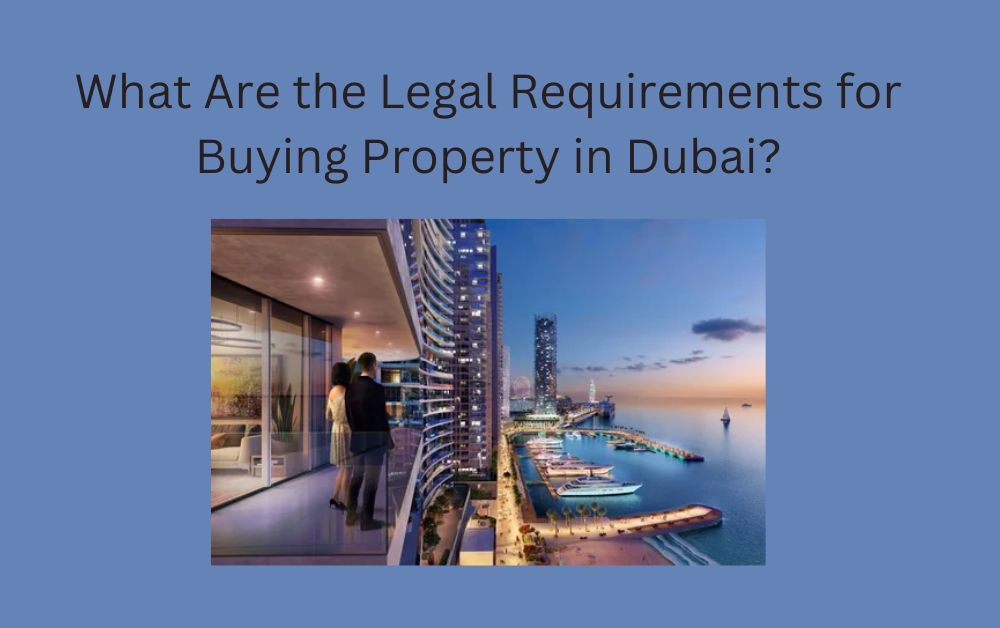What Are the Legal Requirements for Buying Property in Dubai?
Dubai is one of the most popular destinations for property investment. With its booming economy, luxurious lifestyle, and tax-free benefits,...

Dubai is one of the most popular destinations for property investment. With its booming economy, luxurious lifestyle, and tax-free benefits, many people from around the world are interested in buying property in this vibrant city. However, before making a purchase, it is important to understand the legal requirements involved. In this guide, we will explain everything you need to know in simple terms.
NOTE: Looking for the best properties in Dubai? Whether you’re searching for a dream home or a smart investment, Dubai’s real estate market offers incredible opportunities. Explore top listings today and make your next move with confidence!

Understanding Property Ownership in Dubai
Dubai allows both residents and non-residents to buy property, but there are specific rules to follow. Knowing these rules will help you make an informed decision.
Who Can Buy Property in Dubai?
Dubai’s property market is open to both UAE nationals and foreigners. However, the type of property and location you can buy depends on your residency status.
- UAE Nationals and GCC Citizens – They can buy property anywhere in Dubai, including freehold and leasehold areas.
- Foreigners (Non-UAE Residents) – They can buy property only in designated freehold areas approved by the government. Some popular freehold areas include Downtown Dubai, Dubai Marina, Palm Jumeirah, and Jumeirah Village Circle (JVC).
Types of Property Ownership
Dubai offers two main types of property ownership:
- Freehold Ownership – This allows the buyer to have full ownership of the property and the land it is built on. It is the most common option for foreigners.
- Leasehold Ownership – In this case, the buyer leases the property for a period of 10 to 99 years but does not own the land. This option is more common in non-freehold areas.
Legal Requirements for Buying Property in Dubai
To buy a property in Dubai, you must follow certain legal steps. Understanding these requirements will help you avoid any legal issues.
1. Choose the Right Property
Before anything else, decide on the type of property you want to buy. Consider factors such as location, budget, amenities, and potential return on investment.
2. Work with a Registered Real Estate Agent
Hiring a registered real estate agent is highly recommended. The Dubai Land Department (DLD) regulates all real estate agents, and you should ensure your agent is registered with the Real Estate Regulatory Agency (RERA).
3. Sign a Sales Agreement (Memorandum of Understanding – MOU)
Once you have chosen a property, the next step is to sign a Memorandum of Understanding (MOU) with the seller. This document outlines the terms and conditions of the sale.
Key Points in the MOU:
- Details of the buyer and seller
- Agreed sale price
- Payment terms
- Transfer date
- Responsibilities of both parties
The buyer must pay a deposit, usually 10% of the property price, when signing the MOU.
4. Obtain a No Objection Certificate (NOC)
Before the property is transferred, the buyer needs to obtain a No Objection Certificate (NOC) from the property developer. This confirms that the property has no outstanding service charges or legal issues.
5. Transfer of Ownership at the Dubai Land Department (DLD)
Once the NOC is obtained, the final step is to transfer the property at the Dubai Land Department (DLD).
Documents Required for Property Transfer:
- Original passport (for non-residents)
- Emirates ID (for residents)
- Signed MOU
- NOC from the developer
- Cheques for payment (if applicable)
At the time of transfer, the buyer must pay the DLD transfer fee, which is typically 4% of the property value.
Financing Your Property Purchase
If you need financial assistance, Dubai banks offer mortgage options for both residents and non-residents.
Mortgage Eligibility for Foreigners
- Non-residents can get a mortgage, but they may have to make a higher down payment.
- Residents with a valid UAE visa can get mortgages with lower down payment requirements.
Down Payment Requirements
- For UAE Residents: Minimum 20% of the property value
- For Non-Residents: Minimum 25% – 50%, depending on the bank and property value
Additional Costs to Consider
When buying property in Dubai, it’s important to budget for additional costs beyond the purchase price.
1. Dubai Land Department (DLD) Fees
- 4% Transfer Fee – Paid to the Dubai Land Department
- Registration Fee – AED 2,000 to AED 4,000 depending on the property value
2. Agency Fees
- Usually 2% of the property price, paid to the real estate agent
3. Mortgage Fees (If Applicable)
- Mortgage registration fee: 0.25% of loan amount
- Bank processing fee: Up to 1% of loan amount
4. Annual Service Charges
- Property owners must pay annual service charges for maintenance and management. These vary based on the community and developer.
Final Thoughts: Is Buying Property in Dubai Right for You?
Dubai’s real estate market offers great opportunities for investors and homeowners. However, understanding the legal requirements is crucial to making a smart decision.
Key Takeaways:
- Foreigners can buy property in designated freehold areas.
- Ensure your real estate agent is RERA-registered.
- The MOU and NOC are essential steps in the buying process.
- Be prepared to pay 4% DLD fees, agency fees, and service charges.
- If using a mortgage, check your eligibility and down payment requirements.
By following these legal requirements and working with professionals, you can make a safe and successful property purchase in Dubai. Whether you’re looking for a family home or a high-return investment, Dubai offers a range of options to suit your needs. Start exploring today!
For more insightful articles related to this topic, feel free to visit thenewsus


